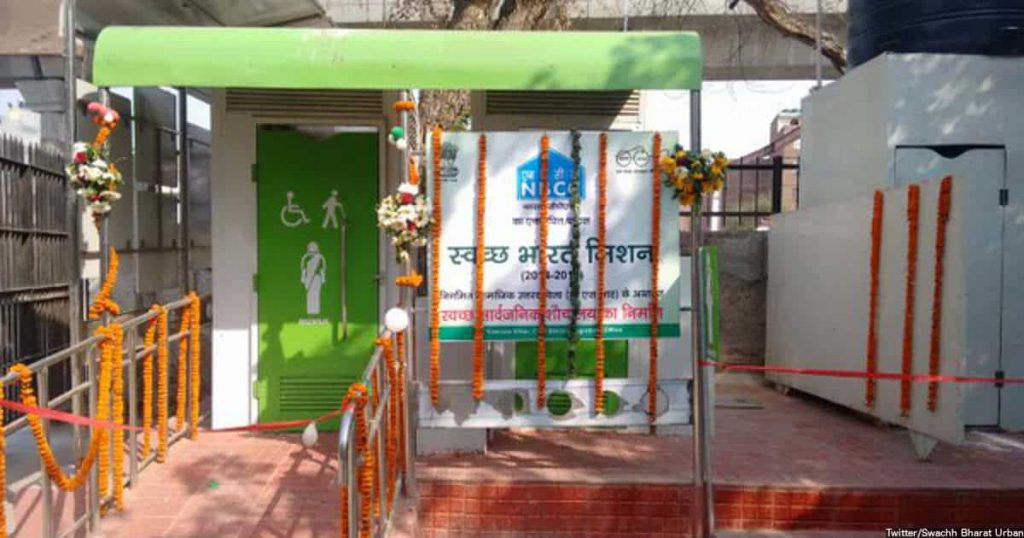 Delhi: “With eight years of Swachh Bharat, today, in urban areas, there is a high scope of innovative services that focus on the functionalisation of public and community toilets. Swachh Bharat 2.0 provides for aspirational toilets in high footfall places like tourist locations and places of significance. The vision of the Swachh Bharat Mission 2.0 in five years cannot be completed without access to functional toilets. A link to aspiration of this mission is that every Indian city should have ODF++ certification, in the next five years,” said Roopa Mishra, Joint Secretary and National Mission Director, Swachh Bharat Mission (Urban), Ministry of Housing and Urban Affairs, in her keynote address at the WASH Leaders Forum 2022 organised by the Toilet Board Coalition, held on the theme of ‘A Collaborative Action Agenda for Private Sector and Government in WASH in India’.
Delhi: “With eight years of Swachh Bharat, today, in urban areas, there is a high scope of innovative services that focus on the functionalisation of public and community toilets. Swachh Bharat 2.0 provides for aspirational toilets in high footfall places like tourist locations and places of significance. The vision of the Swachh Bharat Mission 2.0 in five years cannot be completed without access to functional toilets. A link to aspiration of this mission is that every Indian city should have ODF++ certification, in the next five years,” said Roopa Mishra, Joint Secretary and National Mission Director, Swachh Bharat Mission (Urban), Ministry of Housing and Urban Affairs, in her keynote address at the WASH Leaders Forum 2022 organised by the Toilet Board Coalition, held on the theme of ‘A Collaborative Action Agenda for Private Sector and Government in WASH in India’.
She further added, “On 15th August, when the nation was celebrating 75 years of Indian independence, we saw, more than 500 cities declared themselves as ‘Safai Mitra Surakshit’. It is about the commitment of moving from manholes to machine holes, adopting technology for desludging and not to bring hazard to human beings in the cleaning of septic tanks and sewers.”
Organised by the Toilet Board Coalition, the forum discussed India’s thriving sanitation economy and water, sanitation and hygiene (WASH) marketplace, and featured a pioneering group of global companies, government, and societal leaders that are shaping the future of sanitation in India. The Toilet Board Coalition India is led by LIXIL, Unilever, Athena Infonomics, TÜV SÜD, USAID and the Asian Development Bank. In line with the vision of the ‘Safai Mitra Surakshit Challenge’ and ‘Swachh Bharat 2.0’, the Coalition is soon going to launch a free-of-cost training module for sanitation workers involved in the maintenance of public toilets in multiple languages.

The Toilet Board Coalition partners with leading organisations to shape future smart, sustainable sanitation systems. Having framed the opportunity of the Sanitation Economy, the Toilet Board Coalition has assembled growing evidence of significant new benefits for business and society across sectors – an estimated $148 billion annual opportunity by 2030 in India alone. The Sanitation Economy leverages innovative toilet design, recovery of biological resources within the Circular Economy, and smart digital technologies – these new sanitation systems are rapidly deployable, come at a fraction of the cost and are climate-friendly.
Elaborating on the organisation’s collaboration with diverse stakeholders, Priyanka Tanwar, Toilet Board Coalition India Chair and Leader Communications and Corporate Responsibility, Asia Pacific and Greater China, LIXIL, said, “This is a very interesting time for us at the Coalition. Starting from the Swachh Bharat Mission, we have witnessed a stronger, more conducive ground to accelerate work towards a circular Sanitation Economy in India. As a global water technology organisation, LIXIL’s purpose is to make better homes a reality for everyone, everywhere, and we are committed to improving access to sanitation for 100 million people by 2025. We have pioneered a shift towards a new approach to sanitation, especially through strategic collaborations like with the Coalition. Toilet Board Coalition India has impacted over 70 million lives by facilitating large-small company partnerships, and public-private collaboration to contribute to universal access to sustainable sanitation products and services. We look forward to scaling our efforts towards a sustainable sanitation economy.”
Following the keynote address, the Panel Discussion saw speakers articulate the need to align with the government’s Swachh Bharat vision, the importance of a common set of standards for all stakeholders, and effective collaboration between the government and business to unlock systemic demand and attract investors. The panellists highlighted how low-cost solutions, built on innovation and technology, can offer last-mile access to implement new sanitation business solutions and achieve transformational impact across health and hygiene, climate change mitigation, food security, and livelihoods.
The business leaders panel featured Priyanka Tanwar, Toilet Board Coalition India Chair and Leader Communications and Corporate Responsibility, Asia Pacific and Greater China, LIXIL; Bratin Roy, Sr. Vice President, Industry Service and Sustainability, TÜV SÜD South Asia, South-East Asia, Middle East, and Africa; Apoorv Shukla, Development Finance Specialist, USAID India; and Sapna Poti, Director Strategic Alliances, Office of the Principal Scientific Adviser to the Government of India.
The business leaders’ discussion was followed by the ‘Scaling Urban WASH’ and ‘Sustainable Treatment’ sessions, which saw presentations by small and medium-sized enterprises (SMEs) that are supported by the Toilet Board Coalition’s Accelerator programme. The programme offers SMEs mentorship, partnership, and visibility support to scale their Sanitation Economy businesses. Over the last six years, the Toilet Board Coalition Accelerator programme has worked with 52 SMEs from around the world, providing sanitation products and services; touching more than 70 million people.
Highlighting the impact of the Accelerator programme in India, Venugopal Gupta, Managing Director, Accelerator, Investments and India, Toilet Board Coalition said, “The Toilet Board Coalition built the world’s leading Accelerator programme dedicated to scaling sanitation SMEs. In the last six years, 97 per cent of the Accelerator’s graduates received partnership or investment through the programme and almost half of these SMEs are based in India. The potential for further sector growth is massive as we have estimated a $148 billion Sanitation Economy opportunity by 2030 in India alone. The Accelerator programme aims to further the Toilet Board Coalition’s vision of creating a global marketplace for self-sustaining and resilient sanitation systems and address the global sanitation crisis.”
While SMEs Lootel and EcoLoo showcased how they are working to scale urban WASH by facilitating access to toilets and menstrual hygiene management, SMEs Fluid Robotics and PadCare Labs spoke about how they are using AI and advanced technologies for sustainable treatment solutions.

